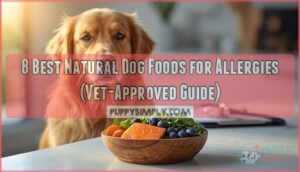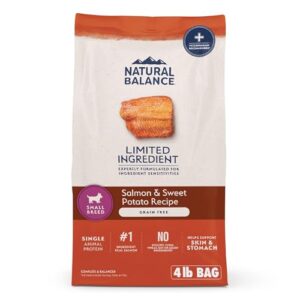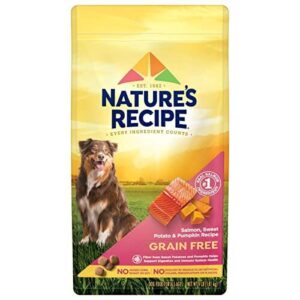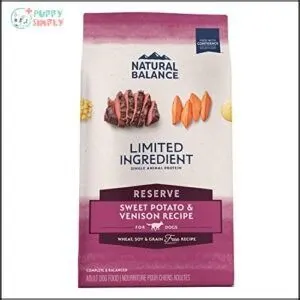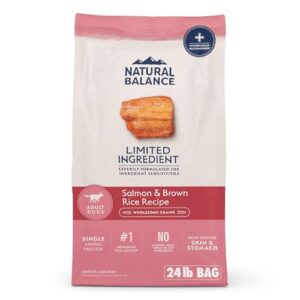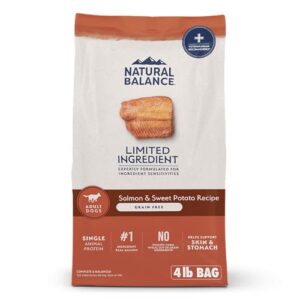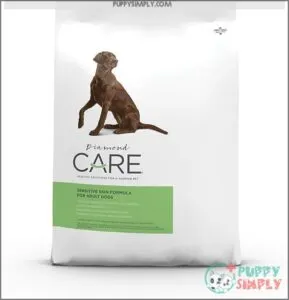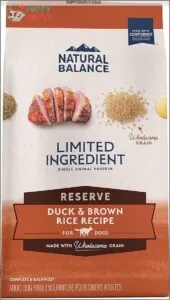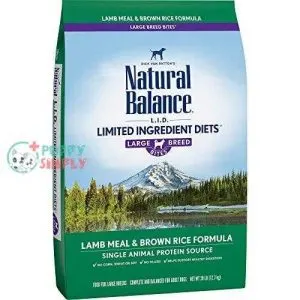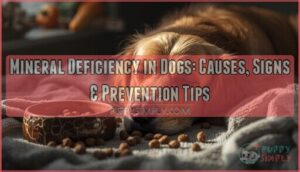This site is supported by our readers. We may earn a commission, at no cost to you, if you purchase through links.
Your dog won’t stop scratching. The vet bills keep piling up. You’ve tried everything, but those red, inflamed ears and patchy skin just won’t heal.
If this sounds familiar, you’re not alone—over 80% of allergic dogs react to environmental triggers, while food allergies account for roughly 10% of cases. The tricky part? Food allergies produce year-round symptoms that mimic other conditions, making them frustrating to pin down.
Switching to a natural dog food for allergies can transform your pup’s health, but not all formulas deliver results. Finding the right one starts with understanding what’s actually causing the itch.
Table Of Contents
- Key Takeaways
- Common Causes of Allergies in Dogs
- Recognizing Dog Allergy Symptoms
- Key Ingredients in Natural Dog Food
- How Hypoallergenic Dog Foods Work
- Diagnosing and Managing Food Allergies
- Transitioning to Allergy-Friendly Dog Food
- Top 8 Natural Dog Foods for Allergies
- 1. Natural Balance Salmon Small Breed Food
- 2. Nature’s Recipe Salmon Dog Food
- 3. Natural Balance Sweet Potato Venison Dog
- 4. Natural Balance Salmon and Brown Rice
- 5. Natural Balance Salmon and Sweet Potato
- 6. Diamond Care Sensitive Skin Dog Food
- 7. Natural Balance Duck and Brown Rice
- 8. Natural Balance Lamb Meal Dog Food
- Buyer’s Guide to Selecting Dog Food
- Benefits of Natural Diets for Allergic Dogs
- Frequently Asked Questions (FAQs)
- What is the best food to feed a dog with allergies?
- What foods are good for dogs with itchy skin?
- What is the best natural treatment for dog allergies?
- What meat is best for dogs with allergies?
- What are the symptoms of food allergies in dogs?
- What foods are most likely to cause dog allergies?
- How do I know if my dog has a food allergy?
- What are the best dog foods to alleviate allergies?
- How long before allergy symptoms improve with new food?
- Can dogs develop new allergies over time?
- Conclusion
Key Takeaways
- Over 80% of dog allergies stem from environmental triggers rather than food, but food allergies cause year-round symptoms that often mimic other conditions, making limited ingredient diets with novel proteins like venison or salmon your best diagnostic and management tool.
- Hydrolyzed protein diets achieve 60-88% clinical remission in allergic dogs by breaking proteins into fragments too small for the immune system to recognize, though you’ll need to watch for quality issues since 67% of these products contain undeclared proteins.
- An 8-week elimination trial under veterinary supervision remains the gold standard for diagnosing food allergies, with 90% of affected dogs showing improvement during this period and most relapsing within 7 days of reintroducing trigger ingredients.
- Omega-3 fatty acids from fish oil can reduce skin inflammation by 50% within six weeks while supporting coat health, making them a crucial component whether you’re managing food sensitivities or environmental allergies in your dog.
Common Causes of Allergies in Dogs
When your dog starts scratching or dealing with digestive upset, allergies might be the culprit—but not all allergies work the same way.
Dogs react to different triggers, from the food in their bowl to the environment around them. Let’s break down the main types of allergies you should know about.
Food Allergies Vs. Environmental Allergies
While food allergies account for only about 10% of canine allergy cases, environmental allergies affect over 80% of allergic dogs. This creates diagnostic challenges, as allergy symptoms overlap considerably—both types cause itching and skin irritation.
However, food allergies generally produce year-round symptoms and frequent ear infections, whereas environmental allergies often follow seasonal patterns with paw licking after outdoor exposure. Proteins, such as beef and chicken, are common dog allergens.
Common Food Allergens in Dog Diets
When diagnosing food allergies, your vet will likely start by testing for beef—it accounts for 34% of all canine food allergies. Dairy intolerance follows at 17%, then chicken sensitivity at 15%. Wheat, the most common grain allergen, triggers reactions in 13% of cases, though true grain allergies remain rare. Egg allergies affect roughly 4% of dogs, while corn and soy rank lower on the list.
These allergies evoke a strong immune system response to specific ingredients.
Role of Flea Allergies in Skin Irritation
Beyond diet, flea allergy dermatitis is one of the most widespread causes of skin allergies in dogs. Just one flea bite injects saliva proteins that trigger intense itching—and that itch-scratch cycle can last days. You’ll often spot hair loss, hot spots, and secondary infections near the tail base and lower back. Preventative measures work best: year-round flea control stops the problem before skin irritation starts.
- Even a single flea can trigger severe allergic reactions
- Flea allergy dermatitis affected 154 of every 10,000 dogs in 2017
- The itch-scratch cycle leads to open sores and bacterial infections
- Prevention costs less than treating chronic dog skin allergies
Recognizing Dog Allergy Symptoms
Spotting an allergy in your dog isn’t always straightforward—symptoms can show up in ways you mightn’t expect. From constant scratching to tummy troubles, allergic reactions affect different dogs differently.
Let’s look at the three main categories of symptoms you should watch for.
Signs of Food Allergies
Your dog’s body can signal trouble in surprising ways. Food allergies often trigger non-seasonal skin pruritus—constant itching that doesn’t follow pollen patterns. You might also notice ear infections, vomiting, or diarrhea. Studies show that up to 44% of allergic dogs develop both gastrointestinal distress and skin issues simultaneously. Some even exhibit ocular signs like redness or rare systemic reactions. These allergy symptoms persist year-round, demanding attention.
| Body System | Common Allergy Signs | Frequency in Affected Dogs |
|---|---|---|
| Skin | Itching (feet, face, abdomen), hot spots | Nearly all cases |
| Ears | Recurrent infections, inflammation | About 50% |
| Digestive | Vomiting, diarrhea, increased stool frequency | 20-30% |
| Eyes/Respiratory | Conjunctivitis, sneezing (rare) | Occasional |
Symptoms of Skin Allergies
Skin allergies in dogs create a cascade of visible distress. You’ll spot excessive itching—often severe—targeting paws, face, ears, and belly.
Over 82% of affected dogs suffer intense scratching that leads to hair loss and thickened skin. Paw licking leaves telltale brown stains, while secondary infections from bacteria or yeast complicate matters in nearly half of cases.
Skin lesions, red patches, and recurrent ear trouble round out the picture.
Gastrointestinal and Respiratory Reactions
Though less obvious than itchy skin, gastrointestinal issues affect about 30% of dogs with food allergies. Vomiting triggers, chronic diarrhea, and gut dysbiosis signal digestive distress that standard treatments won’t resolve until you remove the culprit.
Respiratory distress includes:
- Chronic cough severity worsening at night
- Nasal discharge with upper airway inflammation
- Ear inflammation affecting comfort and balance
Allergy symptoms persist until dietary intervention begins.
Key Ingredients in Natural Dog Food
When you’re choosing dog food for allergies, ingredients matter more than you might think. The right protein source, fewer filler components, and specific nutrients can make all the difference in keeping your dog comfortable.
Here’s what to look for in natural dog foods designed to reduce allergic reactions.
Limited Ingredient Diets
When your dog won’t stop scratching, limited ingredient diets can be transformative. These formulas strip away the unnecessary, generally featuring just 7–10 core ingredients with real meat as the first. By eliminating common triggers like corn, soy, and wheat, you reduce ingredient reactivity and give your dog’s immune system a break.
| Diet Feature | Benefit |
|---|---|
| 7–10 ingredients | Easier allergen identification |
| Real meat first | Quality protein sources |
| No corn/soy/wheat | Reduced immune triggers |
| 8-week trial | Diagnostic use in food allergy |
Nearly 80% of dogs respond positively within eight weeks, making these diets essential for both diagnosis and long-term management of dog food allergies. Diet effectiveness improves when you stick exclusively to the prescribed formula—no treats or table scraps allowed.
The hypoallergenic dog foods market is booming, projected to hit $25 billion by 2035, reflecting growing awareness among pet parents like you.
Novel Protein Sources (venison, Salmon, Duck)
Venison, salmon, and duck represent strategic alternatives when common proteins trigger your dog’s allergies. These novel protein sources account for less than 5% of food allergy cases, compared to chicken and beef’s 80%.
Venison delivers 87% symptom improvement, while salmon provides omega-3s that reduce inflammation.
Duck offers high digestibility at 87–92%, though its fat content requires attention for less active dogs.
Grain-free and Gluten-free Options
You’ve likely heard the grain-free buzz, but here’s the reality: less than 1% of dogs actually have grain sensitivities. While the grain-free dog food market now holds 45% of premium options, animal proteins cause 90% of food allergies—not grains.
Despite grain-free diets dominating 45% of premium dog food, animal proteins cause 90% of food allergies while less than 1% of dogs have grain sensitivities
If your dog shows dog allergy symptoms, consult your vet before switching. Many grain-free diets substitute potatoes or lentils, which may impact digestive health and heart function.
Benefits of Omega-3 Fatty Acids
Think of omega fatty acids as your dog’s built-in allergy fighter. EPA and DHA from fish oil can cut skin inflammation by 50% within six weeks while improving coat health and shine.
These marine-based nutrients strengthen your dog’s immune response to allergens, reducing itching and redness. Your veterinarian recommendations generally suggest 68–70 mg EPA + DHA per kg body weight daily for best dosage and symptom relief.
How Hypoallergenic Dog Foods Work
Hypoallergenic dog foods aren’t all created equal, and understanding how they work can help you make the right choice for your pup. Some use special processing methods to break down proteins, while others rely on carefully selected ingredients that won’t trigger your dog’s immune system.
Let’s look at the three main approaches that make these foods effective for allergic dogs.
Hydrolyzed Protein Diets
Hydrolyzed protein dog food breaks down proteins into tiny fragments—usually under 5 kDa—so your dog’s immune system won’t recognize them as threats. This protein hydrolysis process is key to allergenicity reduction in hypoallergenic dog food.
Here’s what you should know:
- Clinical remission happens in 60% to 88% of allergic dogs when they eat these diets, according to controlled trials
- Molecular weight matters—proteins larger than 5 kDa can still trigger reactions in sensitive dogs
- Digestive effects can occur, including diarrhea or constipation, due to high osmolarity from the hydrolysis process
- Not all hydrolyzed diets are equal—studies show 67% contain undeclared proteins that may cause relapse
- Market growth reflects demand—the global hydrolyzed animal protein market is projected to reach $961.8 million by 2035
Your veterinarian can help determine if a hydrolyzed diet is right for managing your dog’s food allergy. These formulas work best during elimination trials to pinpoint specific allergens causing symptoms.
Therapeutic Veterinary Diets
Therapeutic veterinary diets require a prescription and are formulated specifically for dogs with confirmed food allergies. Your veterinarian can guide you toward options that deliver symptom reduction in 46.4% of cases within 60 days.
These diets cost roughly $180-$250 monthly for a 40-pound dog, but compliance rates exceed 80% in clinical trials. Most owners continue long-term use after successful allergy diagnosis, making them a reliable investment in your dog’s health.
Non-prescription Allergy-friendly Formulas
If prescription diets aren’t an option, nonprescription formulas offer a practical alternative. The hypoallergenic dog food market—valued at $5 billion in 2025—continues to grow as owners seek ingredient transparency and proven health outcomes.
Over 70% of dogs with food allergies show reduced symptoms within eight weeks. Your veterinarian can recommend formulas that meet AAFCO standards while addressing specific allergy symptoms through market growth-driven innovation and regulatory oversight.
Diagnosing and Managing Food Allergies
Figuring out what’s triggering your dog’s allergic reactions isn’t always straightforward, but it’s a critical first step toward relief. Your veterinarian can guide you through a structured approach that pinpoints the problem ingredient and helps you build a feeding plan that works.
Here’s what that process generally involves.
Elimination Diet Trials
Diagnosing food allergies in your dog isn’t guesswork—it requires a strict elimination diet trial lasting 5 to 8 weeks. This increases the success rate from 80% to 95% in pinpointing the allergen.
Here’s what to expect during the trial:
- Feed only a novel protein or hydrolyzed diet with no treats or table scraps
- Monitor symptoms daily using a food diary to track itching, redness, or digestive issues
- Wait at least 8 weeks for over 90% of food-allergic dogs to show improvement
- Reintroduce ingredients gradually to confirm diagnostic confirmation—most dogs relapse within 7 days
Your veterinarian will guide you through each phase, ensuring accurate food allergy diagnosis.
Working With Your Veterinarian
When your dog’s itchy skin won’t quit, partnering with your veterinarian becomes essential for accurate food allergy diagnosis. They’ll recommend allergy testing and create an individualized treatment plan targeting your dog’s specific allergy symptoms.
Here’s what veterinary collaboration offers:
| What Your Vet Provides | How It Helps Your Dog |
|---|---|
| Diet adjustments with therapeutic veterinary diets | Eliminates allergens systematically |
| Symptom monitoring protocols | Tracks improvement objectively |
| Medication options (antihistamines, supplements) | Controls inflammation and discomfort |
This partnership improves long-term wellness—83% of owners report better symptom management with veterinary guidance.
Keeping a Food Diary for Dogs
Tracking every meal, treat, and symptom in a detailed diary gives you the clearest picture of your dog’s food allergy triggers. Record data elements like ingredient lists, feeding times, and symptom severity tracking daily for 8 to 12 weeks—the trial duration needed to identify true allergens.
Include environmental factors and medication changes, since owner compliance with thorough documentation directly impacts elimination diet success and long-term allergy management.
Transitioning to Allergy-Friendly Dog Food
Switching your dog to a new food isn’t something you should do all at once. A rushed change can upset your dog’s stomach and make it harder to tell if the new food is actually helping with allergies.
Here’s how to make the shift safely and watch for signs that things are going in the right direction.
Gradual Food Introduction Tips
Switching dog food requires patience—think of it as letting your pup’s gut adjust to a new routine. When changing to an allergy-friendly diet, a gradual introduction over 7 to 10 days lessens digestive upset considerably, especially for allergy-prone dogs.
- Days 1–2: Mix 25% new food with 75% old food
- Days 3–4: Use a 50:50 ratio of new to old
- Days 5–7: Increase to 75% new food, 25% old
- Days 8–10: Complete the change to 100% new food
This stepwise approach aids successful allergy management during your elimination diet.
Monitoring for Digestive Upset
Once you’ve started the shift, watch your dog’s stool consistency and appetite changes daily—these tell you how well your pup’s handling the new food. Keep a food diary tracking digestive concerns like soft stools or gastric distress.
If food intolerance signs appear, slow your shift speed. Persistent symptoms warrant a veterinary consultation, especially during elimination diet trials for food sensitivities.
Adjusting Diet Based on Symptoms
When symptoms of allergies like itchy skin or digestive concerns shift, you need to respond with precision rather than guesswork. Managing diet flares starts with flare symptom tracking against your food diary.
- Rechallenge ingredient identification: reintroduce suspect proteins one at a time over 14 days
- Quantifying clinical response: aim for 50% reduction in scratching within 8 weeks
- Owner refinement practices: eliminate hidden triggers in treats and supplements immediately
Your vet will guide adjustments based on food intolerance patterns observed.
Top 8 Natural Dog Foods for Allergies
After working with your vet to identify your dog’s specific allergens, you’ll need a food that actually delivers on its promises.
The products below have been carefully selected based on ingredient quality, protein sources, and their track record with allergic dogs. Each option offers something different, so you can find the right match for your dog’s unique needs.
1. Natural Balance Salmon Small Breed Food
Natural Balance Salmon Small Breed Food stands out as a strong choice for allergy management in smaller dogs. Fresh salmon serves as the single protein source, minimizing common food triggers while delivering omega-3 fatty acids to support sensitive skin.
The ingredient analysis shows 24% crude protein with no corn, wheat, or soy—just salmon and sweet potatoes. Most dogs tolerate this formula well during elimination trials, though you should introduce it gradually. The smaller kibble size makes it easier for small breeds to chew and digest.
Best For: Small breed dogs with food sensitivities or allergies who need a grain-free, single-protein diet that supports skin and digestive health.
- Real salmon as the sole animal protein source reduces common allergy triggers while providing omega fatty acids for healthier skin and coat
- Grain-free formula with sweet potatoes excludes corn, wheat, soy, and artificial additives that often cause sensitivities
- Smaller kibble size designed specifically for small breed jaws promotes better chewing and supports dental health
- Bags may lack proper sealing mechanisms to maintain freshness over time
- Some dogs have experienced digestive upset or allergic reactions despite the limited ingredient formula
- Product quality and odor have been inconsistent according to several user reports
2. Nature’s Recipe Salmon Dog Food
Nature’s Recipe Salmon Dog Food offers real salmon as the first ingredient, delivering 25% crude protein with omega-3 support for sensitive skin. This grain-free formula includes sweet potatoes and pumpkin for digestive health, making it a solid pick for dogs with food allergies.
Customer reactions vary—many report reduced itching and firmer stools, though some dogs experienced digestive upset. Safety concerns emerged from past recalls and independent testing that detected trace amounts of corn and soy despite grain-free claims.
Veterinary use remains common in elimination trials, particularly for managing chronic skin health issues.
Best For: Dogs with food sensitivities or mild allergies who need a limited-ingredient diet with real salmon and digestible carbs like sweet potato and pumpkin.
- Real salmon as the first ingredient provides 25% crude protein and omega-3s for skin and coat health
- Grain-free formula with sweet potatoes and pumpkin supports healthy digestion
- Commonly used in veterinary elimination trials for identifying food triggers
- Some dogs experienced vomiting and diarrhea after switching to this food
- Independent testing found trace corn and soy despite grain-free marketing claims
- Past voluntary recalls due to possible Salmonella contamination in related products
3. Natural Balance Sweet Potato Venison Dog
If venison hasn’t been in your dog’s bowl before, Natural Balance Sweet Potato Venison Dog offers a true novel protein option. The formula delivers 20% crude protein from a single animal source—ideal when you’re tracking down food triggers.
Sweet potatoes provide fiber without grains, supporting digestion in sensitive stomachs. User feedback highlights improvements in itchy skin and coat quality, though a few owners noted formula changes affecting consistency.
At $27.98 for four pounds, it’s a higher-priced option that meets AAFCO standards for complete nutrition.
Best For: Dogs with food sensitivities or allergies who need a novel protein source and grain-free diet to manage skin issues or digestive problems.
- Single-source venison protein makes it easier to identify and avoid food triggers in allergy-prone dogs
- Sweet potato provides grain-free fiber that supports healthy digestion without common allergens like wheat or soy
- Includes omega-3 fatty acids and balanced nutrition that meets AAFCO standards for complete adult dog nutrition
- Higher price point at $27.98 for 4 pounds compared to standard dog food options
- Some users reported formula inconsistencies and potential quality issues when ordering through certain retailers
- A few dogs experienced decreased interest in eating or ongoing skin issues despite the limited ingredient approach
4. Natural Balance Salmon and Brown Rice
Brown rice swaps in carbohydrates without the grain-sensitivity risks, making this formula a standout for dogs with food intolerance. Fresh salmon delivers 24% crude protein—above AAFCO minimums—while keeping chicken, corn, and wheat out of your dog’s system. Ingredient limitations work in your favor when pinpointing triggers.
Omega-3s target itchy skin from the inside, and consumer feedback shows visible coat improvements within weeks. It’s hypoallergenic dog food that doesn’t compromise nutrition. At $72.99 for 24 pounds, you’re investing in allergy support your vet would recommend.
Best For: Dogs with food sensitivities or allergies who need a limited-ingredient diet that still delivers complete nutrition and supports skin, coat, and digestive health.
- Single animal protein source (salmon) with no poultry, corn, wheat, or soy reduces common allergen exposure
- High omega-3 and omega-6 fatty acid content (1.0% and 2.5-3.0%) targets skin inflammation and promotes visible coat improvements within 8-12 weeks
- Exceeds AAFCO protein standards at 24% crude protein while maintaining digestive-friendly fiber levels under 4.5%
- Some customers report soft stool issues during or after the transition period
- Quality control complaints include packaging problems and occasional incorrect kibble size or bag weight
- Higher price point at $72.99 for 24 pounds compared to non-limited-ingredient formulas
5. Natural Balance Salmon and Sweet Potato
Sweet potato steps in as the digestible carb, delivering fiber without grain triggers—ideal for dogs struggling with food intolerance. Omega Fatty Acids from salmon oil target inflamed skin while supporting Digestive Health through potassium-rich sweet potatoes.
This Limited Ingredients formula keeps salmon as the sole Salmon Protein Source at 24% crude protein, meeting all life stages under AAFCO standards.
Consumer Ratings average 3.9 stars, with owners noting calmer stomachs and shinier coats. At roughly $4 per pound, it’s solid dog food for allergies when you need clean dog nutrition without the guesswork.
Best For: Dogs with food sensitivities or allergies who need a single-protein, grain-free diet that’s easy on the stomach and gentle on irritated skin.
- Salmon as the only animal protein keeps things simple for allergy-prone dogs, while sweet potato provides fiber without common grain triggers like corn or wheat.
- Balanced omega-3 and omega-6 fatty acids from salmon oil help calm inflamed skin and promote a healthier, shinier coat.
- Meets AAFCO standards for all life stages, so you can feed it to puppies, adults, and seniors without switching formulas.
- Some dogs turn their noses up at the salmon smell or taste, making it a gamble if your pup is picky.
- At around $4 per pound, it’s pricier than standard kibble, which adds up fast for larger dogs.
- Quality control complaints pop up when bought from certain retailers, with some customers reporting formula inconsistencies or authenticity concerns.
6. Diamond Care Sensitive Skin Dog Food
Diamond Care Sensitive Skin Dog Food brings hydrolyzed salmon as your dog’s sole protein, splitting molecules down to minimize immune flare-ups in dogs with stubborn skin allergies. 2.5% omega-6 and 0.8% omega-3 fatty acids target irritation at the source, while probiotic benefits from 80 million CFU per kilogram keep digestion steady.
Clinical endorsements from veterinary dermatologists back this formula for long-term allergy management in dogs. At $19.99 and with solid market availability, it’s a vet-developed option when sensitive skin demands real results.
Best For: Dogs with chronic skin allergies or food sensitivities who need a single-protein, limited-ingredient diet that won’t trigger reactions.
- Hydrolyzed salmon protein is broken down to minimize allergic responses, making it effective for dogs with severe food sensitivities
- Clinical-grade omega fatty acid ratios (2.5% omega-6, 0.8% omega-3) actively reduce inflammation and itching
- 80 million CFU probiotics per kilogram support gut health, which directly impacts skin condition and immune response
- Kibble size may be too large for small breed dogs to comfortably chew
- Some dogs experience gas or bloating from ingredients like psyllium seed
- Results aren’t universal—not every dog will see improvement in their skin condition
7. Natural Balance Duck and Brown Rice
Natural Balance Duck and Brown Rice offers a single-animal-protein approach for dogs battling food sensitivities. Duck protein delivers essential amino acids at 21% crude protein minimum, while brown rice supplies digestible fiber without wheat, corn, or soy.
Ingredient safety is backed by regular independent testing for contaminants, and the company’s recall history sits below industry averages.
Consumer feedback highlights over 75% satisfaction for allergy relief, with improved skin and stool consistency often visible within four to six weeks—real progress you can track.
Best For: Dogs with food allergies or sensitivities to common proteins like chicken and beef who need a simple, transparent formula to calm their skin and digestive issues.
- Single duck protein source minimizes allergen exposure while delivering 21% crude protein for muscle support
- Over 75% of owners report noticeable improvements in itching, hot spots, and stool quality within 4-6 weeks
- Regular independent testing and below-average recall history back up the safety claims
- Some customers complain the food has an unpleasant smell
- May cause soft stools or digestive upset in certain dogs during transition
- Packaging problems reported occasionally, and availability can be limited in some areas
8. Natural Balance Lamb Meal Dog Food
Lamb and brown rice form a classic limited ingredient dog food for allergies, and Natural Balance’s formula delivers 21% crude protein with minimal filler. Real lamb meal provides essential amino acids without common triggers like chicken or beef.
However, veterinary recommendations note that some dogs can develop lamb sensitivities over time—about 54% relapse in clinical reviews. Consumer feedback shows strong digestive health impact for many, though a few report vomiting or loose stools. You’ll want veterinary oversight during the shift.
Best For: Large breed dogs with confirmed food allergies to chicken or beef who need a straightforward lamb and rice formula, though it requires vet supervision since some dogs develop lamb sensitivities over time.
- Single animal protein source (lamb meal) with 21% crude protein reduces exposure to common allergens like chicken, beef, and soy
- Brown rice and limited ingredients support digestive health—many owners report reduced vomiting and improved stool consistency
- Omega-6 fatty acids (1.7% minimum) and canola oil promote healthy skin and shiny coat in allergy-prone dogs
- Clinical reviews show 54% of allergic dogs eventually relapse on lamb and rice diets, meaning some dogs develop lamb sensitivities with extended use
- Mixed digestive results with some dogs experiencing vomiting or loose stools after switching, requiring careful monitoring
- Premium pricing compared to standard dog foods, and the 28-pound bag may feel like an expensive gamble if your dog doesn’t tolerate it
Buyer’s Guide to Selecting Dog Food
Picking the right food for your allergic dog isn’t just about reading the label—it’s about knowing what standards matter and who can help you make the best choice. Two key factors should guide your decision every time.
Let’s look at what you need to keep in mind when you’re standing in that pet food aisle.
Importance of AAFCO Approval
When shopping for dog food for allergies, you’ll want to look for AAFCO standards on the label. This ensures the pet food meets baseline nutrient adequacy requirements for your dog’s life stage.
While AAFCO approval doesn’t measure ingredient quality, it does guarantee regulatory compliance with safety standards—reducing risks from nutritional imbalances that can worsen allergy management.
Brands like Hill’s Science Diet and Royal Canin clearly display this statement, giving you confidence in their formulations.
Consulting With a Veterinarian
Before you buy any allergy-focused food, consult your veterinarian—they’re essential for accurate allergen identification and preventing misdiagnosis of dog allergies. Here’s why veterinary diets and diet supervision matter:
- Elimination trials under vet guidance achieve over 90% accuracy in identifying true food allergies versus environmental triggers
- Specific treatment plans address your dog’s specific allergy triggers and symptoms of allergies
- Ongoing monitoring leads to outcome improvement and better long-term allergy management in dogs
Professional support makes all the difference.
Benefits of Natural Diets for Allergic Dogs
Switching your allergic dog to a natural diet can make a real difference in how they feel day to day. The right ingredients work together to calm irritation, support healthy skin, and boost your pup’s overall quality of life.
Here’s what you can expect when you make the switch.
Improved Skin and Coat Health
Your dog’s coat tells a story about what’s happening beneath the surface. When you switch to natural formulations rich in omega-3 fatty acids, you’re supporting barrier function at the skin level.
This matters for dogs with skin allergies and itchy skin. Essential nutrients like EPA and DHA improve hydration by reducing water loss through the epidermis. If you’re unsure what’s triggering your dog’s skin issues, a 5Strands pet allergy test can help pinpoint food or environmental sensitivities.
The result? Healthier dog health overall and a noticeably glossier coat.
Reduced Inflammation and Allergy Symptoms
Beyond a healthier coat, natural diets can lower inflammation biomarkers tied to allergies. Omega-3 benefits include reducing allergic reactions and calming itchy skin.
Studies show dogs on therapeutic diets with limited ingredients experience measurable drops in symptom score—less scratching, fewer skin allergies, and quieter digestive tracts. For many pups, symptoms of allergies simply become easier to manage over time.
Enhanced Overall Canine Well-being
When allergy relief takes hold, you’ll likely notice your dog bouncing back with improved vitality. Clinical studies confirm that dogs on elimination diets show increased energy and playfulness within weeks.
Here’s what pet health improvements often look like:
- Enhanced digestion and fewer stomach upsets
- Stronger immune support with reduced flare-ups
- Long-term remission of chronic symptoms
This kind of dog health and nutrition approach promotes lasting canine health and overall pet nutrition goals.
Frequently Asked Questions (FAQs)
What is the best food to feed a dog with allergies?
The best food for dogs with food allergies usually features protein hydrolysates or novel proteins like venison, which shows 87% improvement rates.
Limited ingredient dog food helps identify triggers, while appropriate ingredient sourcing promotes gut health and reduces symptoms of allergies effectively.
What foods are good for dogs with itchy skin?
Sometimes the richest diets cause the most trouble. For itchy skin, you’ll want dog food for allergies featuring limited ingredients, novel proteins like salmon or venison, and Omega-3 benefits that support skin microbiome and gut health.
What is the best natural treatment for dog allergies?
Managing skin allergies and food allergies in dogs works best with a multi-pronged approach. Omega-3 benefits include reduced itchy skin inflammation. Herbal remedies like chamomile help naturally.
Probiotic effectiveness promotes gut health, while acupuncture therapy shows promise.
Diet limitations through elimination trials pinpoint triggers for better dog nutrition outcomes.
What meat is best for dogs with allergies?
Novel protein sources like venison, duck, or kangaroo work best for dogs with food allergies—these meats show 79-87% improvement rates.
Hydrolyzed protein diets offer even better results when multiple allergies complicate single-source protein selection.
What are the symptoms of food allergies in dogs?
Dogs with food allergies scratch constantly, targeting their paws, belly, and face. You’ll notice ear infections that keep returning, along with vomiting, diarrhea, and sometimes skin infections from all that scratching.
What foods are most likely to cause dog allergies?
Beef, dairy, chicken, wheat, and lamb are the most common food allergens in dogs. These protein-rich ingredients trigger the majority of canine food allergies, affecting roughly 1–2% of dogs receiving veterinary care.
How do I know if my dog has a food allergy?
Is your pup scratching more than usual? Watch for itchiness indicators like persistent paw licking, ear infections, and gastrointestinal signs—vomiting or diarrhea.
These symptoms of skin allergies warrant a vet consultation for proper allergy testing.
What are the best dog foods to alleviate allergies?
Look for limited ingredient dog food with hydrolyzed proteins or novel proteins like salmon or venison.
Hypoallergenic dog food enriched with omega-3 benefits and probiotic support helps reduce reactions to common food allergens.
How long before allergy symptoms improve with new food?
Most dogs with food allergies see skin symptoms improve within 4–8 weeks of switching dog food, though gastrointestinal issues often resolve faster.
Adherence during the diet trial length determines your dog’s symptom remission timeline.
Can dogs develop new allergies over time?
Like fine wine that doesn’t always age well, your dog’s immune response can shift over time. Dogs absolutely can develop new food allergies as they mature, with allergy onset age usually around five to six years.
Environmental impact and genetic factors play important roles in these shifting sensitivities.
Conclusion
Think of your dog’s diet as the foundation of a house—without solid materials, everything else crumbles. Choosing the right natural dog food for allergies isn’t guesswork; it’s about identifying triggers, selecting proven formulas, and working closely with your vet.
The eight options we’ve covered offer science-backed nutrition designed to calm inflammation and restore comfort. Your pup deserves relief, and with the right approach, those scratching days can finally end.
- https://snacksafely.com/2025/10/the-top-11-food-allergens-for-dogs/
- https://www.helsinki.fi/en/news/dogs/puppys-diet-seems-be-significant-factor-development-allergy-and-atopy-related-skin-symptoms
- https://datahorizzonresearch.com/hypoallergenic-dog-food-market-7941
- https://mypetgrocer.com/blogs/nutrition/pet-food-trends-in-2025-every-pet-parent-should-know
- https://www.frontiersin.org/journals/veterinary-science/articles/10.3389/fvets.2025.1560806/full

